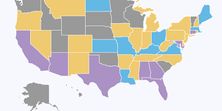Legal Sports Betting Predictions for 2020: When Will New York, Florida and California Make the Jump?
Ethan Miller/Getty Images.
When it came time for our sports betting predictions for 2020, we could only think of one person to help us through it — Daniel Wallach of Wallach Legal.
Wallach is the nation's foremost specialist on gaming law and arguably knows more about the status of sports gambling within each state than perhaps anybody else in the space.
Here are Wallach's six predictions for 2020:
1. New York will either enact a mobile sports betting law or begin the two-year process of amending the state constitution to extend beyond the upstate casinos.
In 2019, New Jersey did $4.5 billion in sports bets, some of those dollars undoubtedly came from New Yorkers, whose state doesn’t currently offer mobile sports betting.
The Empire State does have legalized sports gambling at four upstate casinos, but that's a drop in the ocean compared to what New York could be pulling in with widespread, mobile legalization. How insignificant is what New York is pulling in from its upstate casinos that are allowed to offer retail sports gambling? Delaware had a larger handle than New York in 2019.
Gov. Andrew Cuomo recently left mobile sports betting off his initial budget conversations, but Wallach says he is optimistic that New York is going to enact a mobile betting law in 2020.
If these efforts fall short once again, New York lawmakers will likely have a “Plan B” for the expansion of sports wagering statewide: Initiating the process for amending the state constitution to explicitly permit mobile sports betting, and allowing in-person sports wagering at horse tracks, OTBs, Racinos and professional sports facilities.
The downside of a ballot measure is timing: Any vote on a proposed constitutional amendment would mean that the earliest anything could take place would be November 2021. This would leave the status quo in place for nearly two more years.
2. Massachusetts will legalize sports gambling
One of the most rabid states as far as sports fans go will finally get sports gambling in 2020, Wallach predicts, as money will stop flowing to neighboring states.
"Massachusetts does not have any unique legal barriers such as tribal compacts or constitutional prohibitions,” Wallach said.
With nine bills introduced last year, including one sponsored by Gov. Baker, Wallach expects one of them to cross the finish line in 2020.
3. California will not legalize sports gambling
“The only states with a significant tribal presence that have legalized sports gambling to date are Michigan and North Carolina,” Wallach said. “The tribal presence in California is many times greater.”
Some tribes in the state are for sports gambling, but not for mobile wagering since gaming off Native American lands may not be covered by the federal law regulating Indian gaming.
While it was originally thought that sports gambling had to be approved by a constitutional amendment, Wallach says that the provisions that apply to casinos do not extend to sports betting. Wallach expects that the sports betting will be placed on the ballot this November, but is not optimistic a pro-gambling measure would be approved.
That would result in no sports gambling at all at least through 2021.
4. Florida will legalize sports gambling
Things looked dead in Florida after voters approved Amendment 3, which allows Florida residents to exclusively authorize casino gambling within the state. But Wallach says that the amendment would not stop the legislature from authorizing sports gambling.
Because of that, Wallach says he expects lawmakers to approve sports betting in 2020, without the need for a citizen referendum.
Check out FanDuel, where Action Network users get a risk-free bet up to $500.
5. A federal sports betting bill will be back
In 2018, Senators Chuck Schumer and Orrin Hatch proposed a federal sports betting bill. Wallach thinks that’s coming back.
“It won’t change what the states are doing but it will seek to address the Wire Act again and address reporting practices from state to state,” Walllach said.
6. A more steady flow of competition among operators will take place in legal states
Some states like West Virginia and Rhode Island have a restricted number of licenses, but with the success of mobile in New Jersey and Pennsylvania, Wallach says he expects that more states will follow the Tennessee model and have a more open and competitive environment for mobile wagering — in the best interest of the almighty dollar, of course.
How would you rate this article?



